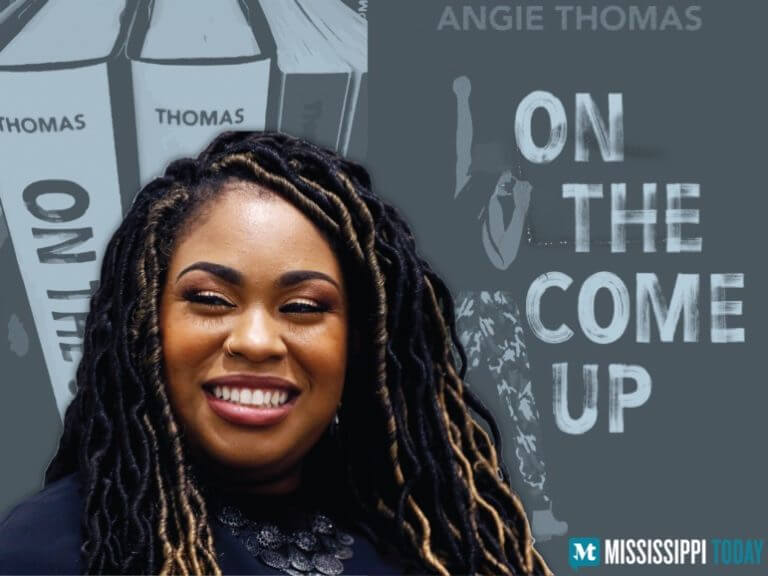
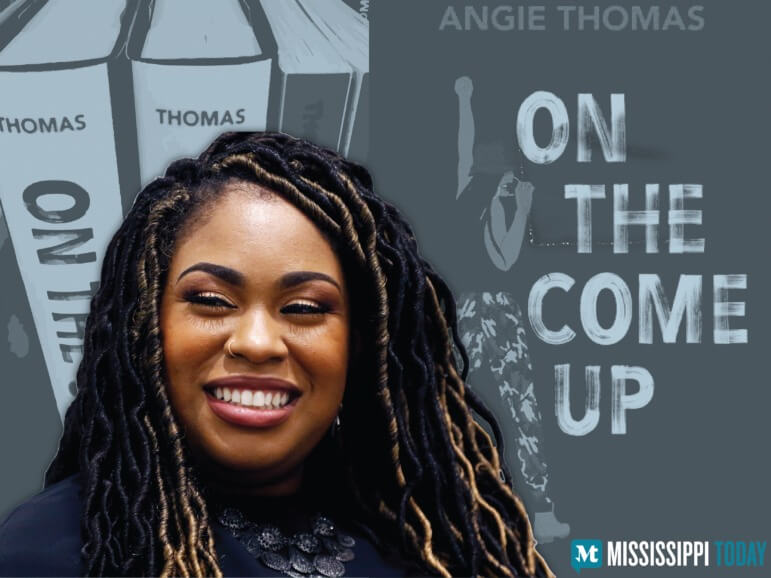
Author Angie Thomas talks self-doubt, giving back, her own biases and homegrown recognition amidst a complicated relationship with Mississippi
By Erica Hensley | August 9, 2020
When Angie Thomas got word she had won an award from Mississippi, she was shocked.
Not only did the award from the Mississippi Institute for Arts and Letters mean more because it was homegrown, it was also for a book she knows makes readers uncomfortable — especially readers in traditionally white, Southern spaces.
“It means a lot more because I recognize that I connected with a number of people through my words, people that I may not have necessarily thought I would have connected with,” Thomas told Mississippi Today. “And it makes me check myself too and recognize that I put biases on people here, and I make assumptions here. I don’t want people to do the same to me, so I gotta stop doing that when it comes to my work and stop assuming that certain types of people wouldn’t read it.”
“So when I got word that I got that award for a book about a rapper, I was like, ‘Are you serious?’ … I’m very appreciative for it. I think this is the one I’m probably most proud of, of all the awards I’ve gotten, because it does come from home.”
In “On the Come Up,” — her 2019 follow-up to the debut bestseller “The Hate U Give” — we meet Bri, a 16-year-old rapper who harkens back to Thomas’s own foray into writing verse, then eventually prose. The book echoes themes prevalent in Thomas’s first book but on a micro scale and shows us how one of our culture’s bedrock principles, that young people should be free to express themselves, doesn’t always apply to young women like Bri. For her, rapping is a way to make sense of and work through the cycle of poverty, violence and addiction that has ravaged her family and others around her. But, to the authority figures in her life, it’s just violent noise that needs to be silenced.
The novel also pays homage to Thomas’s hometown of Jackson — from the scenes taking place at Midtown Arts High School and Sal’s pizza spot to the protagonist’s surname. (Watch, too, for the Outkast and “Black Panther” references.)
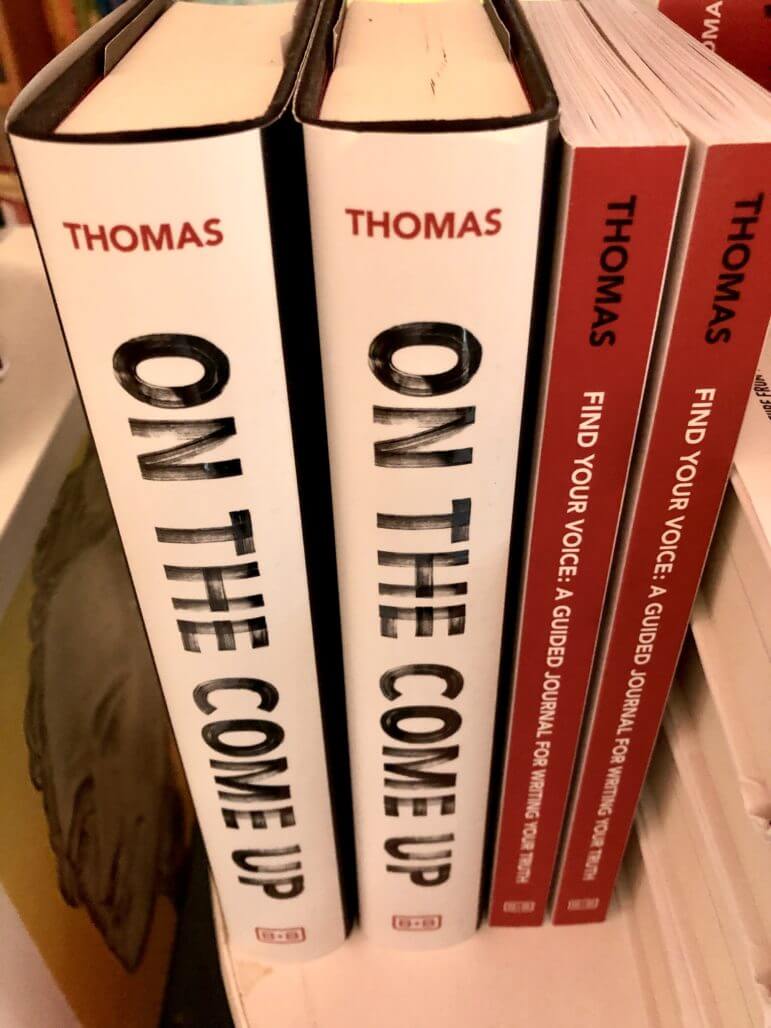
Other references to Mississippi are more sobering, reflecting some of the time’s most heated debates. Bri’s attempts to navigate a mostly white charter school highlights the state’s ongoing school-choice debate, while the book also touches on the social and environmental determinants of health, the social safety net, educational disparities and racial profiling.
As her books challenge the status-quo, Thomas, too, has been vocal about her complicated relationship with Mississippi.
“It’s definitely a complex relationship in the sense where I’m always looking for hope in Mississippi, and I’m always getting disappointed by Mississippi. But, I can’t give up on it because there is so much good here,” she said. “There’s so much good here aside from the bad.”
That’s both why this award catches her differently from the others and provides another impetus to dig in here while focusing on cultivating joy and giving back.
That giving back has changed the life of 18-year-old Jackson native Imani Skipwith who, thanks to a new scholarship in Thomas’s name from her alma mater, is attending Jackson’s Belhaven University’s creative writing program on a four-year full-ride scholarship.
Though she realized she wanted to be a writer in middle school, it wasn’t until a teacher at the Mississippi School for the Arts, where she transferred after 11 years at Jackson Public Schools, helped cultivate her skillset and encouraged her to start a portfolio of her poetry and short stories. Despite “finding inspiration in quarantine” over the past year, Skipwith still doubted herself and her work and was unsure what pursuing a creative writing career would even look like. Until she got a Zoom call — that she thought was family calling in for her high school graduation party — from Angie Thomas in April.
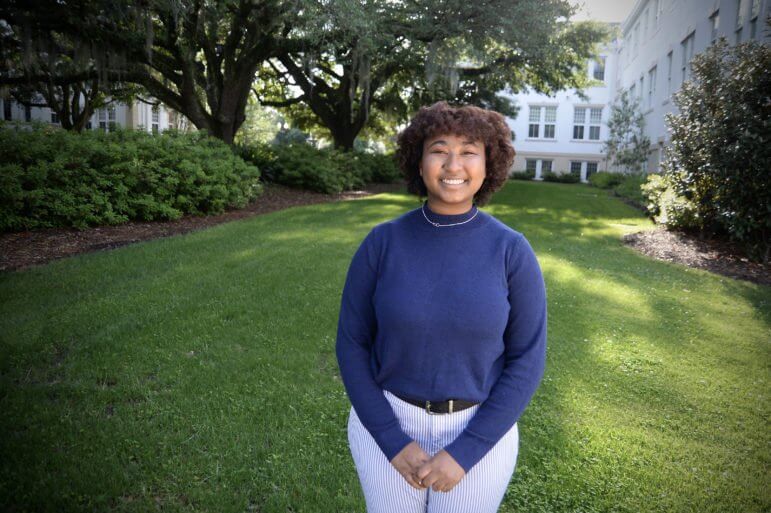
Belhaven University
Imani Skipwith, 18, of Jackson visits Belhaven University after being chosen as the inaugural winner of the Angie Thomas Writers Scholarship, which covers tuition, room and board for four years. Skipwith, already an award-winning writer, will study creative writing.
“Winning this did something,” she said. “It’s something solid I can grab on to.” Of Thomas’s support, she said: “Her work can validate other people — no matter where you come from, no matter what you do, you can get somewhere. This scholarship will help (young people) find self-love and help them in their journey. It’s such a weight off to know someone is in your corner.” In the midst of getting the award herself, she’s already excited for future recipients to share in Thomas-driven Belhaven support system.
Despite her self-doubt that’s slowly growing into self-confidence, she says, Skipwith’s work packs punches while balancing both weight and light. She writes about mental illness and oppression in heavy, but deeply self-aware, ways for a young writer. Through scenes like alternative history narratives of the Vietnam War and sci-fi prose, her writing is bright with emotion and clamors with symbolism, while still begging grounded questions of equity and fairness. Thomas couldn’t help but be impressed after reviewing Skipwith’s portfolio and, upon choosing her work on a blind-read to win the scholarship, told her, “You did this and God did this. I’m just helping you out.”
For Skipwith, the scholarship is two-fold, plus some. The financial support is key — not having to take out loans means she won’t start her writing career in debt and any extra savings in her household can go toward helping her 10-year-old sister save up for college. But, equally important, says Skipwith, is the validation and support that comes from knowing Thomas is in her corner.
“For Angie to get to know me, for her to tell me I’m a good writer — this will become a reaching point for people like me,” Skipwith said. “I cried so hard when I found out, and it’s just a way to break away from everything (negative) you heard.”

Imani Khayyam
Angie Thomas, bestselling author
For Thomas, that emotional support piece is pivotal — and too often missing, especially for young girls that look like her, she says. She did have to take out loans to pay for Belhaven and was all too aware of the lacking diversity in her program at the time. She said the emotional weight of not feeling like she fit in at first compiled upon the financial hardship. She was one of the only students from Jackson — on a Jackson campus — and the first Black young person to graduate from the creative writing program.
“If any of this validates her in any way, I’m so thrilled. Honestly it is important for young people to have that going into college. I think about it — had I had that when I was entering Belhaven in the creative writing program, my experience probably would have been a whole lot different because I was so afraid of, ‘Well what if I’m not good enough, or what if this or what if that?” and validation plays a huge role in all of this. For me, a big part of what I do is giving back to others — instilling in others either what I received or what I didn’t receive,” Thomas said.
“That’s one of the things, validating young writers and letting them know that the stories they want to tell matter. Their voices matter. Their dreams matter, just as much as their lives. If I can even be a footnote in (Skipwith’s) writing legacy or another young person’s writing legacy, then I’ve accomplished mine.”
Thomas hopes the annual scholarship will help give hope to Jackson’s young people, who might not have been supported in their writing and who need help making college work financially. But, too, knowing that there are support systems out there.
“The stress of (loans) is not something any young person should have to deal with when deciding to get a higher education, but that’s the reality we live in. And, specifically young people in Mississippi — so often they deal with other hardships, and I really wanted to reach out to young people in schools that were in the area where they may be dealing with a lot of financial hardship,” she said. “There are kids in Jackson right now who have never seen a skyscraper and there are skyscrapers in downtown Jackson. They’ve never been downtown, never seen an alleyway, never seen anything beyond their neighborhood. And, so, when they don’t see beyond, they don’t know beyond.”
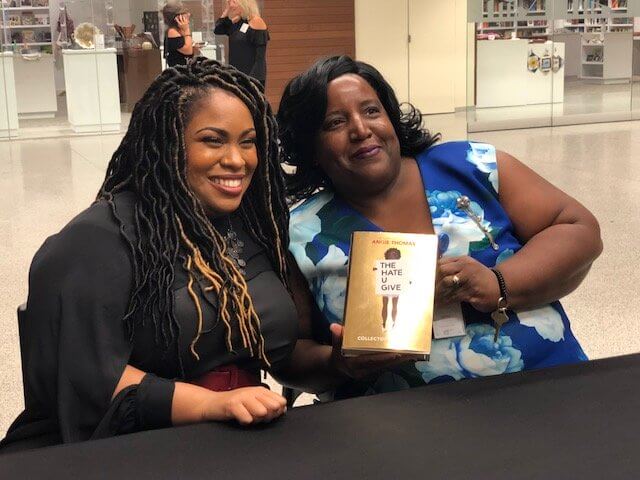
Sereena Henderson / Mississippi Today
Author Angie Thomas (left) takes a picture with one of her fans, Joyce Lawson at a celebration given for Thomas, hosted by the city of Jackson at the Two Mississippi Museums Oct. 10, 2018.
For Thomas, it all comes back to the homegrown recognition for a book written for and to young people of color telling them, “You’ve got this.”
“I hope that it tells young people who identify with my books that they matter here in Mississippi too, that their stories matter here in Mississippi, that a book written to them is getting an award like this,” she says. “I hope it validates them and their existence even a little bit more to know that, yeah, even when there’s an award for literature, a story about a young person like you can get that award. That means you’re worthy, that means you matter, that means your story matters.”
Angie Thomas’s third novel “Concrete Rose,” a prequel to “The Hate U Give,” will be released January 12, 2021 by HarperCollins.
The post Author Angie Thomas talks self-doubt, giving back, her own biases and homegrown recognition amidst a complicated relationship with Mississippi appeared first on Mississippi Today.
- State Supreme Court considers reviving former Gov. Phil Bryant’s lawsuit against Mississippi Today over welfare scandal coverage - February 18, 2026
- Winter storm update: Mississippi still waiting on fed declaration for individual assistance, lawmakers crafting plan to fund recovery - February 18, 2026
- Shy of special session, Mississippi school choice appears dead - February 18, 2026